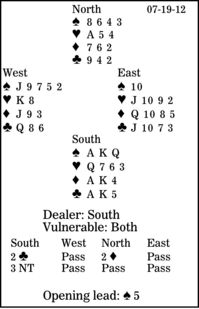Bridge column, July 19: Entries can have a large effect

That sounds like a declarer who has gone down in a contract, then realizes that he misplayed and could have gotten home.
Many factors affect the right line of play in any contract. Today, we will look at entries. How should South play in three no-trump after West leads a low spade to declarer's king? What should South do differently if the club ace were in the dummy?
Here is that awful auction again, with South burning up so much bidding space to show 25 to 27 points and a balanced hand.
South has eight top tricks: three spades, one heart, two diamonds and two clubs. Where might the ninth winner come from?
First, spades might be 3-3. Although that is unlikely given the lead, it cannot hurt to find out. Declarer cashes a top spade, seeing East discard, say, a diamond. (If East follows a second time, South should take his third spade winner.)
Now declarer needs to establish a second heart trick. The right play is to duck (lose) the first round, then to cross to the ace, planning to lead back toward the queen. Here, when the king pops up on the second round, South is safe.
If dummy had a second entry, though, the best heart play changes slightly. Declarer should lead a heart to dummy's ace, then duck the second round. If the king has not appeared, South returns to dummy with a club and plays another heart toward his queen.
** ** **
COPYRIGHT: 2012, UNITED FEATURE SYNDICATE
DISTRIBUTED BY UNIVERSAL UCLICK FOR UFS

